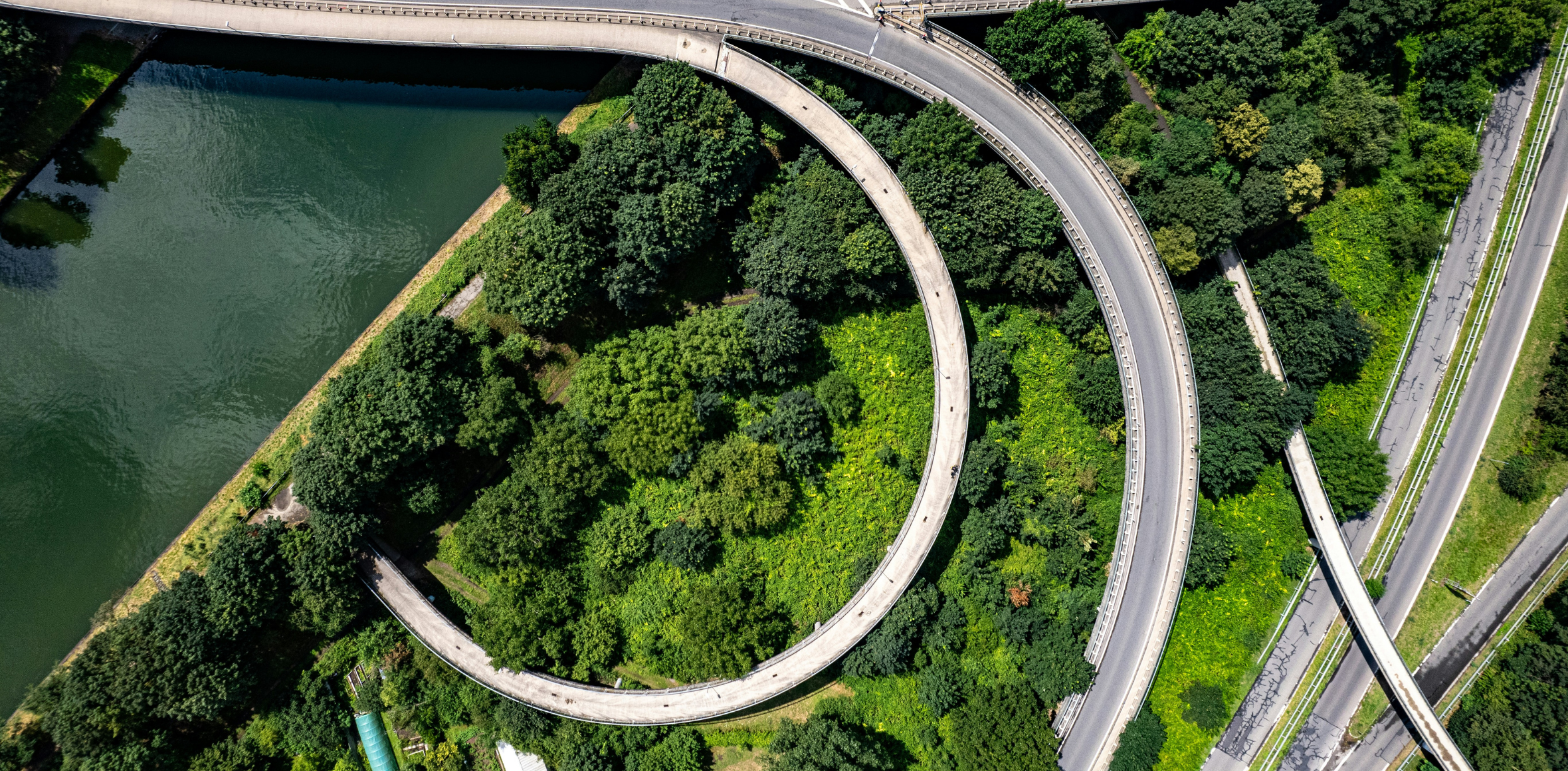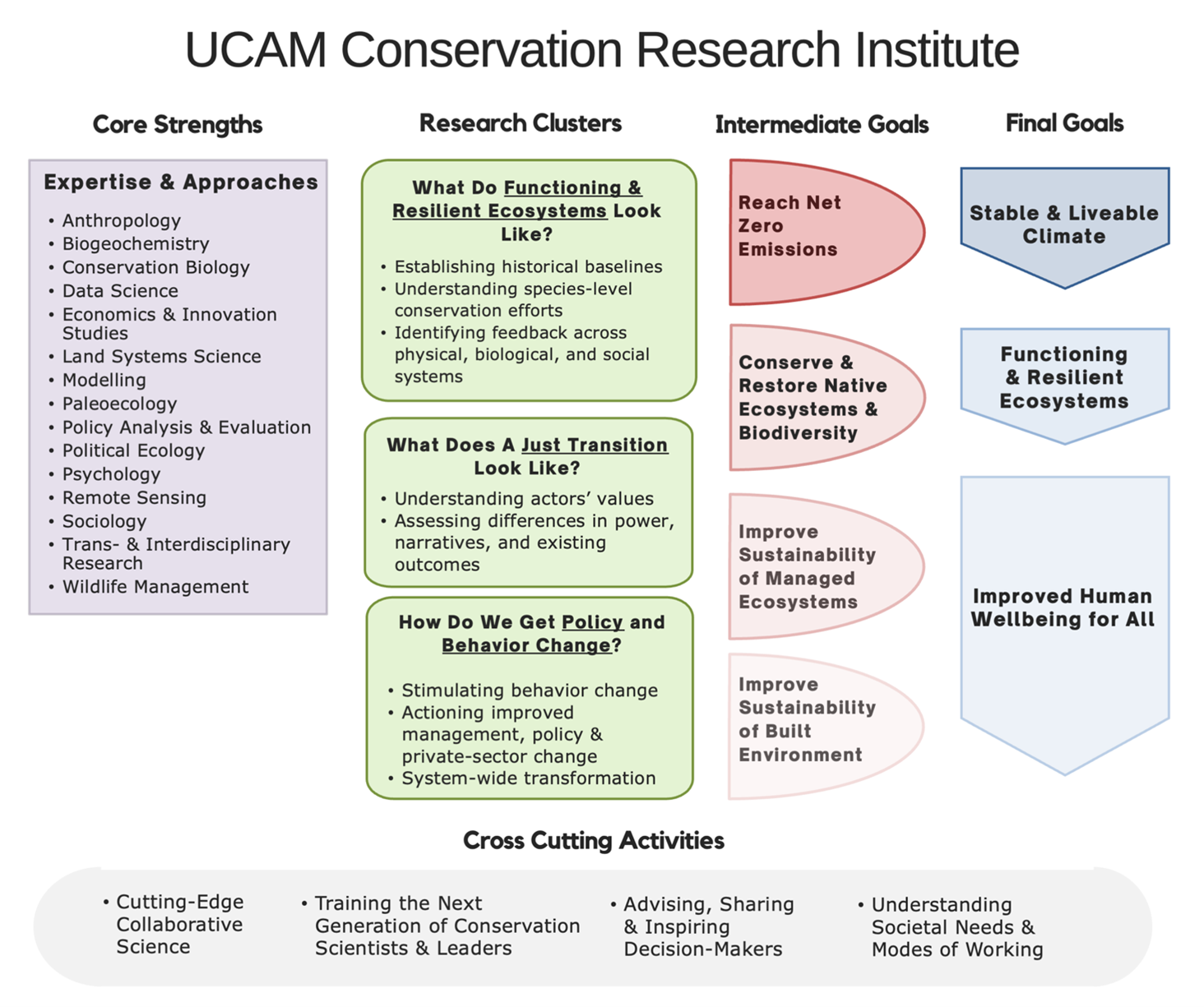We are an inclusive interdisciplinary community of world-leading researchers with an interest in conservation.
The University of Cambridge Conservation Research Institute (UCCRI) is the bridge between the University of Cambridge and the Cambridge Conservation Initiative (CCI), a collaboration between the University and ten leading conservation organisations.
CRI serves as the academic “engine room” of CCI and connects to multiple sustainability initiatives at the University of Cambridge. The community has diverse goals which include conducting research and activities that contribute to the protection and flourishing of global biodiversity, a stable and livable climate, functioning and resilient ecosystems, and improved human well-being for all, as well as broader research on the relationship between biodiversity conservation and society.
To achieve these goals, our work contributes to conserving and restoring native ecosystems and biodiversity, reaching net-zero emissions, and the improved sustainability of managed ecosystems and built environments. It also includes reflexive examination on conservation in science and practice.
Over the past 13 years we have published hundreds of papers on these themes, mentored dozens of early career researchers, and contributed to multiple curricula across the University. Our shared space in the David Attenborough Building contributes to our diverse set of collaborations, collegiality, and common purpose.
Table of Contents
- How do we protect & enhance biodiversity, ecosystem functioning & resilience?
- What does a just transition look like?
- How do we ensure a just transition to enhanced conservation outcomes?
Research Strategy Map
How do we protect and enhance biodiversity, ecosystem functioning & resilience?
|
What does a just transition look like?
|
How do we ensure a just transition to enhanced conservation outcomes?
|
| Approach |
Approach |
Approach |
- Identify historical baselines for biodiversity and functioning, resilient ecosystems;
- Understand roles and effectiveness of species-level conservation efforts; and
- Measure feedbacks between biological, geophysical, and social systems.
|
- Understand communities’ values, norms, beliefs, and rights;
- Assess how differences in power and narratives affect existing outcomes; and
- Supporting decolonial and critical reflections on existing conservation science.
|
- Identify how to stimulate behavioural change and action improved management; and
- Evaluate and design policy and private-sector policies to achieve system-wide transformation.
|
Conducting cutting-edge collaborative science in relation to conservation challenges.
|
|
Our Institute includes members from 8+ departments at UCAM. Since 2019, UCCRI staff have published 500 papers in leading journals and has secured over £20 Million in grants and donations, nearly all of which involve collaboration across disciplines. Examples of scientific innovation born at UCCRI and collaborating with CCI and UCAM partners include the Centre for Landscape Regeneration (Diaz Anadon, Balmford, Coomes, Lines, Pellegrini, Sandbrook, an others), providing knowledge and tools necessary to regenerate the British countryside using cost-effective nature-based solutions and the Centre for Earth Observation which is developing AI tools and computing systems to monitor threats to biodiversity. CCI/UCCRI seminars feature speakers from a range of academic, policy, and practitioner backgrounds. These events attract large audiences and catalyse new collaborations.
|
|
Future aim:
Develop new interdisciplinary approaches and more strategic collaborations through new grant applications and CCI Collaborative Impact Projects.
|
Training the next generation of conservation scientists & leaders
|
|
We contribute to the following University of Cambridge undergraduate triposes: Archaeology and Anthropology, Computer Science, Geography, Human, Social, and Political Sciences, Land Economy, Management Studies, and Natural Sciences. Our highly successful Masters in Conservation Leadership has brought over 265 students from 91 countries to Cambridge, many of whom return home to leadership positions. Our PhD and post-doctoral students similarly come from a range of backgrounds and have achieved strong academic and professional careers. Every year Balmford (Zoology), along with the Tropical Biology Association, leads a Student Conference for Conservation Science. Our early career researcher programme fosters training in transferable skills (e.g. coding, journal article writing, policy interaction). Historically we have been supported by DTPs and individual department admissions.
|
|
Future aim:
Expand our reach through new endowed UCCRI PhD and post-doctoral programs and undergraduate and graduate teaching programs.
|
Understanding societal needs & modes of working
|
|
UCCRI researchers are deeply engaged with local communities where they work to better understand their needs and values. This has enabled a gradual co-development of research ideas and ongoing feedback about the salience and appropriateness of research topics and methods. For example: Chua (Social Anthropology) asks how Anthropocene phenomena and discourses are experienced, conceptualized or contested in specific conservation contexts with a focus on Orangutan conservation; Dicks (Zoology) works with academics, NGOs, and farmers in India to better understand what policies can encourage more sustainable agricultural management; and Sandbrook and others in the Center for Landscape Regeneration aim to understand the values of local officials, farmers, land owners, and NGOs in the Fen, Lake District, and Cairngorm landscapes around restoration. We conduct workshops with community actors and policy makers to understand their visions for the future.
|
|
Future aim:
Engage even more with communities and policy makers through participatory planning methods and workshops to envision and enable the transformative changes needed for a just transition.
|
Advising & inspiring decision-makers
|
|
Most researchers in UCCRI conduct “use-inspired” research with an emphasis on real-world applications and place a large focus on providing decision-making support. Examples of impact include: i) the Cambridge Centre for Environment, Energy and Natural Resource Governance (CEENRG) impacts on the design of EU and US policies on energy infrastructure, the built environment, and natural ecosystems; ii) the Conservation and Development Lab’s FORESTPOLICY research informing the EU Deforestation Regulation and cocoa and oil palm companies’ zero-deforestation policies; and iii) Edwards has trained over 100 staff from Peru’s national forest oversight agency (OSINFOR) to improve detection of illegal selective logging in the Amazon. We are leaders in international scientific societies across many fields and participate in the Intergovernmental Platforms on Biodiversity and Ecosystem Services (IPBES) and Climate Change (IPCC). UCCRI researchers are heavily involved in policy agenda setting and design processes. We have advisory roles within Natural England, leadership roles in the EU Scientific Board on Climate Change and UN Science Panel for the Amazon, and contribute to the UN Convention on Biological Diversity, as well as UK and international forestry, agricultural, and environment ministries. We also have direct lines to UCAM and College Sustainability Operations with respect to biodiversity related procurement (e.g. Award winning work of CEENRG Student Clare Ma).
|
|
Future aims:
Leverage our strong individual connections through a more unified voice, including joint UCCRI and CCI policy and non-technical briefs.
Generate more impactful communications through greater digital engagement, educational outreach, and public relations campaigns.
|


